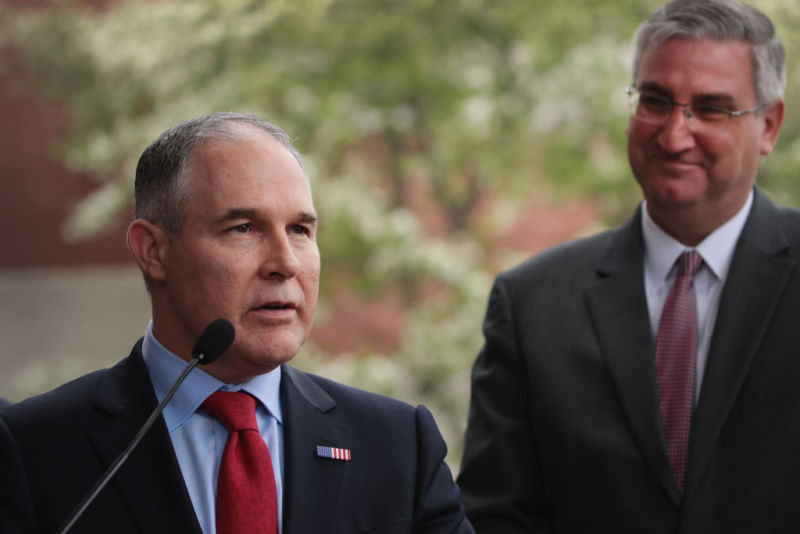
 






.gif)



|
Signature Sponsor


By Megan Geuss
May 8, 2017 - Environmental Protection Agency (EPA) Administrator Scott Pruitt sent a memo to agency employees last week saying that he would recuse himself from lawsuits that he brought against the Agency as Oklahoma Attorney General, according to Reuters. Pruitt sued the EPA more than a dozen times under the Obama administration, challenging policy from the Clean Power Plan to the Waters of the United States rule.
In his Senate confirmation hearing in January, Pruitt hadn’t definitively stated that he would step back from all the lawsuits against the very agency he was about to head. Instead, he said that he would defer to the EPA’s ethics counsel, which stated that he must recuse himself from lawsuits brought against the agency in the year previous.
In a four-page recusal memo sent on Thursday (PDF), which E&E News obtained through a Freedom of Information Act request, Pruitt said that he would “not participate in any active cases in which Oklahoma is a party, petitioner, or intervenor.” The administrator listed twelve cases, including three involving Murray Energy Corp., one of the largest coal mining companies in the US, as well as a case involving Volkswagen “Clean Diesel” Marketing.
The administrator appointed his chief of staff, Ryan Jackson, to screen EPA matters “to determine if they involve any of the entities” listed in the memo.
Pruitt also tied up some other loose ends last week, issuing a clarification of testimony he gave to senators in January regarding his use of personal e-mail to conduct state matters. At the time, Senator Sheldon Whitehouse (D- RI) asked Pruitt to respond in writing to a question about whether Pruitt had ever used private e-mail, text, or other communication channels to conduct business in his capacity as Oklahoma attorney general. Pruitt initially responded that he hadn’t, but, in a letter obtained by E&E News this week, Pruitt clarified that a “small portion” of his private e-mails from his Oklahoma AG days might have included e-mails relating to state business.
Pruitt explained: “Under Oklahoma law, political matters must be transacted using personal e-mail accounts. That includes e-mails concerning political matters that may arguably also touch on state business.”
The administrator defended his initial response saying that it “was based on the best information available at the time and having only four days to complete approximately 1,100 written questions and subparts.” He added that he had recently turned over all of his private e-mails to the Oklahoma Attorney General’s office for review.
Coal Comments
Publicly, Pruitt went on Fox Business’ show Varney & Co. last Wednesday to defend the use of coal on the American grid. According to The Hill, Pruitt initially commented that the US was already “leading the world” in reducing its “CO2 footprint.” He added that “utility companies across this country need fuel diversity. You need solid hydrocarbons on-site that you can store, so when peak demand rises, you’ve got solid hydrocarbons to draw on.”
“What would happen if we had an attack on our infrastructure when you’ve diverted to natural gas almost exclusively, and you don’t have coal there as a safeguard to preserve the grid?” Pruitt reportedly asked. “I mean, it’s a smart strategy for this country to invest in technology and innovation, burn coal, burn natural gas, use renewables, make sure we advance nuclear. But it truly needs to be a part of the fuel diversity with utilities across the country.”
Coal burning is one of the most polluting energy sources on the US grid today, and an abundance of cheap natural gas and wind installations, combined with Obama-era regulations on emissions, have relegated the coal industry to a smaller slice of the overall US energy makeup. That said, coal still made up more than 30 percent of US electricity generation in 2016, according to the Energy Information Administration. Many countries have been moving to close older coal-burning plants and replace them with newer and more efficient sources of electricity without suffering grid instability. In April, the UK had its first full day without burning any coal.
The Trump administration has promised to support coal despite its economic and health-related issues, not to mention its contribution to climate change. Pruitt recently stated in a CNBC interview that he “would not agree that [CO2 is] a primary contributor to the global warming that we see” without offering any explanation for contradicting an overwhelming amount of evidence to the contrary. Pruitt's Department of Energy counterpart, Secretary Rick Perry, recently called for a review of the US energy grid to asse threats to "baseload power" that come from coal retirements, despite utilities and grid operators saying in recent months that coal retirements have not threatened grid reliability.
Scott Pruitt |
 











|
